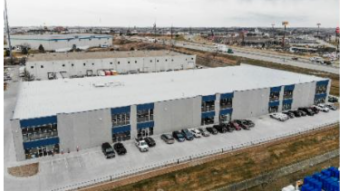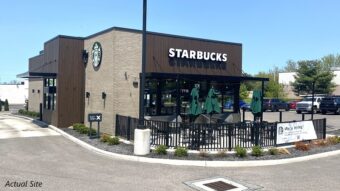The death of brick-and-mortar retail? Ben Meier thinks its wildly overstated.
And Meier should know. He is vice president of brokerage services with The Lerner Company in Omaha. His firm is retail-focused, and he works in a market – Nebraska’s biggest city – that is seeing a flood of new retailers.
Physical retail? It’s changing, Meier admits. But it’s not dying. Far from it.
“It is absolutely busier than busy right now,” Meier said. “It is as busy as we have ever seen it. You read in the media about JCPenney and Sears closing stores. There is a lot of negative reporting out there. It’s almost like a disconnect between what you read and what the reality is. From the standpoint of Class-A and Class-B retail, we are definitely seeing a lot of activity. The retailers here are doing well.”
The reason? Retailers are becoming more creative, or they are focusing more heavily on customer service. Others are offering experiences – everything from climbing walls and high-tech bowling alleys to free cooking classes and yoga lessons – that shoppers can’t get online.
Still others are taking the omnichannel approach. They use their brick-and-mortar stores as a way to attract the attention of customers. They then don’t care if customers purchase items in their physical stores or online.
In other words, those brick-and-mortar retailers that are doing well are doing so by meeting the changing needs of consumers.
The strong U.S. economy is helping, too, Meier said.
“Unemployment is going down and wages are rising,” Meier said. “It really is a perfect storm for retail.”
Meier said that in the Omaha market and throughout the Midwest, both value-oriented and high-end, luxury retailers are doing well today. He said that stores such as Home Depot, Lowe’s and Menards are all seeing an uptick in business.
Stores offering experiences are doing well, too. The Lerner Company counts indoor golf-themed entertainment center Topgolf as one of its clients. That company is doing especially well today. High-end movie theaters that offer dining options are also on the rise, Meier said.
But experiences aren’t just big and bold, Meier said. Some retailers offer more low-key experiences that bring customers back. That experience? It’s customer service.
If you walk into a store and a knowledgeable employee can help you immediately find what you’re looking for? Or that same employee can give you a crash course on which TV or stereo is the best fit for your home? That’s a type of experiential retail, too, Meier said. And it might be just as important as any other type of experience that retailers sell.
“Some retailers are selling execution,” Meier said. “They have the right employees guiding you to the right things. There aren’t any fireworks going off. But as a consumer, I am getting help. So my experience with that retailer is positive. Those retailers, who are providing that exceptional customer service, are doing well.”
Meier points to grocery store chain Hy-Vee. This chain has the biggest market share among grocers in Omaha, Meier said. Hy-Vee stores don’t offer the lowest prices, but they don’t charge the highest. Shoppers know they are getting good value at Hy-Vee, Meier said.
What Hy-Vee does, though, is focus on customer service.
“It’s a friendly and nice experience,” Meier said. “It’s not the whiz-bang experience that some retailers offer, but it is a pleasant one. Some retailers, you go inside their stores and good luck finding someone to help you. At a store like Hy-Vee, the customer service is an important reason for their success.”
It’s tempting for retailers when the economy slumps or profits start to dip to pare back on their employees. The problem with that approach? These retailers then struggle to provide solid customer service.
Shoppers, then, have bad experiences, and they don’t return.
“That just makes their problems worse,’ Meier said.
The smarter retailers know that cutting back on service ultimately hurts.
Today, of course, retailers worry about the threat of online shopping, specifically Amazon. The online retailer is referred to a killer of brick-and-mortar stores.
Meier, though, says that Amazon won’t kill off traditional, physical retailers. These retailers have faced so-called “retail killers” in the past, Meier said, and they’ve always found ways to innovate and survive. It won’t be different this time around, he said.
“When the Sears, Roebuck catalog first came out, that was going to kill the little general stores,” Meier said. “You have this giant book that came in the mail. You could order what you wanted. That was going to kill retail. The door-to-door salesman was going to kill retail. Then you had Walmart and the big-box stores that were going to kill the mom-and-pops. You had these threats, but traditional retail has always found a way to survive.”
Meier points to Best Buy as an example. Analysts thought the electronics chain was in serious trouble. Now, though, the chain is doing better.
How? It adapted. Meier said that Best Buys today promote their expertise. Employees educate shoppers on the array of TV, streaming and audio equipment they can buy.
This focus on customer service has stopped the bleeding, and Best Buy appears to be in good shape once again.
“I’m excited about where retail is going,” Meier said. “People are getting smarter. Things are changing quickly. But the strong retailers are going to adapt. They are going to overcome this threat. It’s kind of exciting to see these retailers executing in a better way.”



